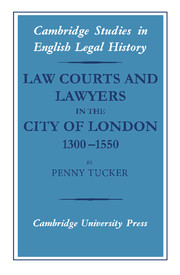Book contents
- Frontmatter
- Contents
- Acknowledgements
- List of abbreviations
- List of figures
- Introduction
- 1 The administration of the law by the city in context
- 2 The distinctiveness of city law and custom
- 3 The city law courts
- 4 The administration of the law in the city's courts: I
- 5 The administration of the law in the city's courts: II
- 6 Judges, jurors and litigants
- 7 The city's law officers
- 8 Legal representation in the city
- 9 The effectiveness of the administration of the law by the city
- 10 Interchange and exchange between the city and the common law
- Appendices
- Bibliography
- Index
- Frontmatter
- Contents
- Acknowledgements
- List of abbreviations
- List of figures
- Introduction
- 1 The administration of the law by the city in context
- 2 The distinctiveness of city law and custom
- 3 The city law courts
- 4 The administration of the law in the city's courts: I
- 5 The administration of the law in the city's courts: II
- 6 Judges, jurors and litigants
- 7 The city's law officers
- 8 Legal representation in the city
- 9 The effectiveness of the administration of the law by the city
- 10 Interchange and exchange between the city and the common law
- Appendices
- Bibliography
- Index
Summary
‘CITY COURTS’ AND ‘COURTS IN THE CITY’
This study focuses on the main city law courts. There were other city courts, but not every court held in London was a city court in the sense employed here: that is, a court which ‘belonged’ to the city, was peculiar to it, and over which it had control. There were, moreover, quite a few courts which have claims to be considered as city courts but which, for the reasons explained below, are either not discussed at all, or are discussed only to a limited extent.
In the second category, courts which were held in the city but which were not courts of the city, are the church courts and private jurisdictions which coexisted with courts administered by or on behalf of the city. Church courts remained a significant element in the administration of the law in, rather than by, London until the end of our period. This was not true of private courts, also known as sokes, but some of them were still functioning effectively (as far as one can tell) throughout the first half of the fourteenth century. Until the 1350s one still finds the sokereeves, or court-holders, of churchmen being appointed to claim their masters' courts in the Husting of Common Pleas. There is even an example, from 1300, of a detinue case being removed from the prior of St Bartholomew's soke into the Sheriffs' Court and from there, on error, into the Mayor's Court.
- Type
- Chapter
- Information
- Law Courts and Lawyers in the City of London 1300–1550 , pp. 84 - 130Publisher: Cambridge University PressPrint publication year: 2007



